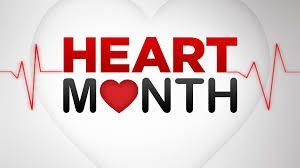National Heart Month

February is national heart month and according to the Centers for Disease Control and Prevention heart disease is the leading cause of death in the United States, causing one in four deaths a year.
Those are odds not worth messing with, so how do you reduce your risk of heart disease? Let us look at some of the factors of heart disease first.
Your age and family history can increase your risk for heart disease. With age, our arteries narrow and harden which causes fats, cholesterol, and other substances to build up on the artery walls; this is called cholesterol. Family history can increase your risk if your family members have or have had heart disease.
High blood pressure, high cholesterol, and smoking can cause heart disease. Obesity is another factor that can lead not only to heart disease, but to high blood pressure and diabetes. So, what do I do to reduce my risk?
Exercise is especially important to reducing your risk for heart disease. Try to get at least two (2) of physical exercise a week. This could be any kind of physical exercise, walking, chair yoga, cycling, knee lifts, working with resistance bands, any kind of exercise that gets your heart pumping.
Eat a diet low in sodium and saturated fats. Eating foods such as vegetables, fruits, whole-grains, vegetable oils, and low-fat or fat-free dairy products will help. Stay away from sweet foods and sweeteners and limit your alcohol intake. Alcohol raises your blood pressure which in turn leads to heart disease.
If you are overweight, try to lose the extra pounds. Obesity increases not only your risk of heart disease, but also can cause a stroke, high blood pressure, high cholesterol, and diabetes. Eating heart-healthy foods and getting regular exercise will help you maintain a healthy weight.
If you smoke, quit now; it is never too late to quit and reduce your risk of heart disease. There are many free resources out there to help you quit.
Stress is another contributor to heart disease as it leads to high blood pressure. Reduce your stress by exercising, finding something you enjoy and doing it, talking to someone about what is going on, listening to music, dancing, thinking positively and just breathing.
Make sure you get enough sleep, and quality sleep. You need around 7 – 9 hours a night. Poor sleep habits can lead to heart disease, high blood pressure and to other medical conditions. Again, exercising will ensure you sleep better along with making sure your bedroom is dark, quiet, and at a relaxing temperature. Do not have any TV’s, smart phones, or computers in your bedroom; screen time disrupts sleep time. Do not have anything heavy to eat before bed and avoid caffeine a few hours prior to bedtime.
Taking care of your heart is easier than you think, small things can make big differences in reducing your risk of heart disease. Make sure you exercise, eat healthier, maintain a health weight, get enough sleep, and quit smoking. Not only will making these changes reduce your risk of heart disease, but they will also improve your overall health and well-being. Start today.




